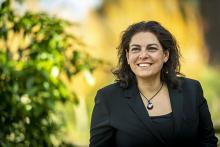US to UK: Why the Karger brothers of TwinFocus Capital opened their second family office in London

Paul and Wesley Karger founded TwinFocus Capital in 2006 to offer global ultra-high net worth professional investors, entrepreneurs and families a unique single family office feel within a multifamily office setting: the “multi-single family office”.
The Boston-based brothers’ firm now advises clients on more than $7.1 billion of assets and manages diversified direct investments in private equity and real estate.
TwinFocus Capital has taken the next step in its evolution by opening TwinFocus London in Mayfair with a staff of professionals supported by the infrastructure and research capabilities established in the Boston office.
 “TwinFocus has always supported globally-situated families and now, with our European office, the true global reach of the firm is more effectively realised,” Wesley Karger (right) said.
“TwinFocus has always supported globally-situated families and now, with our European office, the true global reach of the firm is more effectively realised,” Wesley Karger (right) said.
“We can now bring our pioneering approach of marrying investment management and research with tax, inheritance, business and charitable planning, more easily to clients worldwide.”
CampdenFB asked the Karger brothers what they had to do to branch out across the pond, what US and UK family investors are searching for and how families can mitigate the predicted global economic downturn.
What prompted your decision to open a second family office in the UK?
TwinFocus has always had a long term interest to be in Europe given the firm’s global client base. The firm has always placed long standing importance of family owned enterprises in the UK and Europe more widely. TwinFocus was chosen to work with a founding European family who required and valued our service and whom adopted TwinFocus’s total balance sheet approach. This first family previously had their own dedicated single family office, but this required additional resource and institutional capability and hence our Single-Multi Family Office approach really did resonate with them. Furthermore, the key was to find the right managing partner in Europe who bought into the TwinFocus values and whom we could trust and work with.
 Did Brexit influence your decision and are families concerned about the UK’s split from the EU?
Did Brexit influence your decision and are families concerned about the UK’s split from the EU?
No, it did not impact our decision and as in life, uncertainty creates opportunity. Brexit has divided families and opinion more generally, but strategically, it does not change the dynamics around UHNW families requiring our service proposition. The longer term implications of Brexit may lead to changes in family and corporate holding structures which in itself requires us to create innovative solutions that meet the families' needs.
What practical steps did you have to consider to set up the second family office?
Initial investment costs were material with the cost of establishing a London office and recruiting staff. London is an expensive city and hence the barrier to entry for doing this job well is high, but we’re strongly committed and made the appropriate investments. We also had to work through the regulatory aspect of FCA rules which are different to the US.
 Which services are particularly in demand from UK families compared to US?
Which services are particularly in demand from UK families compared to US?
A discretionary investment programme and we’ve had a greater need for raising capital and providing corporate finance solutions to our families. There is also a more significant offshore planning requirement, given the large number of non-UK-domiciled families residing in the UK.
In which assets are UK and US families’ investing/co-investing for robust returns?
We have invested in sustainable energy with TwinFocus being a lead investor in a completely carbon neutral investment supported by the UK government. The move to socially responsible investing is a big long term opportunity and families place importance on this area.
How are families dealing with family office recruitment and retention of top talent?
The cost of hiring top talent is high and we think this is a longer term challenge for family offices who do not have the scale of assets to afford the investment or the network to acquire the appropriate in-house advisers. That is one of our major advantages as a firm—we have the scale and wider infrastructure to deliver an institutional service, but remain independent and be their family office.

Are you seeing an increase in succession planning among families and how formal is that planning?
Yes, as wealth is maturing through the baby boomer ageing profile, next generation planning has become a central focus for our Family Office Team. Again there is a particular need in Europe given the larger number of family owned businesses versus other territories. Succession planning around corporate ownership/management, and separately in terms of transferring assets in a tax efficient manner, is a need we are addressing with our families on an active and continuous basis.
What measures are families taking to mitigate the effects of the global economic downturn this year, if they believe there will be a downturn?
For those families that have significant liquidity management needs, the key is a well-diversified portfolio across asset classes which can handle material drawdowns in markets. We spend a considerable amount of time trying to understand our families’ risk tolerance and the key here is to plan and not make any knee jerk reactions. We are long term investors with significant allocation to private and alternative investments which provide a good level of protection and in many cases can benefit from risk on type scenarios.
 How do you see UK and US family offices evolving in 2020?
How do you see UK and US family offices evolving in 2020?
A key focus for family offices globally in 2020 is addressing the social impact needs of their underlying families and the next generation who are demanding a more innovative placement of capital which meets both a profit motive and their social impact needs. Family offices must develop a solution for this pressing requirement.






